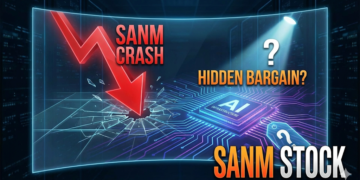Robinhood Markets Inc. (NASDAQ:HOOD) is a California-based financial technology company that has radically transformed the way individual investors access and participate in the stock market. Founded in 2013 by Stanford University alumni Vlad Tenev and Baiju Bhatt, Robinhood launched with a mission to democratize finance for all—a bold vision to make investing more inclusive, affordable, and accessible to everyone, regardless of income or experience level.
Headquartered in Menlo Park, Robinhood quickly disrupted the traditional brokerage industry by pioneering commission-free stock trading, a model that forced established firms like Charles Schwab, E*TRADE, and TD Ameritrade to eliminate trading fees. With its sleek, user-friendly mobile app and modern interface, Robinhood attracted millions of millennial and Gen Z users who had never invested before. The platform’s intuitive design, combined with real-time market data and no account minimums, made it easy for users to buy and sell stocks, ETFs, and options with just a few taps—something that had previously been costly and complex.
In the years that followed, Robinhood’s user base exploded, and the platform became a cultural phenomenon among retail investors. By 2020, it had become a central player in the rise of the “retail investor revolution,” as millions of new traders entered the markets during the COVID-19 pandemic. Robinhood’s influence was undeniable during high-profile events like the GameStop and AMC trading surges, where it became both a champion of financial inclusion and a subject of regulatory scrutiny. Despite controversies, its popularity only grew, and the company went public in July 2021 under the ticker symbol HOOD.
Robinhood has since evolved far beyond its initial role as a no-commission stock trading app. Today, it is a multi-dimensional fintech platform offering a wide array of financial products and services including cryptocurrency trading, retirement accounts, cash management, credit cards, options trading, and advanced investing tools. The company is also rapidly expanding into international markets, bringing its disruptive technology to users in Europe, the UK, and Canada.
As of 2025, Robinhood is leading the charge in tokenized finance, launching stock and ETF tokens, crypto futures, and even private equity tokens for major firms like SpaceX and OpenAI, enabling everyday investors in Europe to gain exposure to traditionally inaccessible private companies. With its expanding global reach, acquisition of crypto platforms like Bitstamp and WonderFi, and strategic integration of AI-powered tools, Robinhood is positioning itself at the forefront of a new era in investing—one where blockchain, automation, and democratized access drive the next wave of financial innovation.
From a startup shaking up Wall Street norms to a global financial services pioneer, Robinhood Markets, Inc. is reshaping what it means to invest in the modern world. As more investors around the world seek transparency, simplicity, and control over their financial futures, Robinhood remains one of the most closely watched—and widely used—platforms leading that transformation.
From Brokerage App to Global Fintech Giant
Robinhood’s meteoric rise started with its revolutionary “zero-commission” trading model, which disrupted Wall Street incumbents and forced legacy brokerages to follow suit. With a sleek user interface and viral popularity among younger retail investors, Robinhood became a symbol of modern investing. But today, it’s clear that the company’s ambitions are far greater than disrupting commissions—they are reinventing financial infrastructure itself.
Through strategic expansions in crypto, decentralized finance, AI, and tokenized assets, Robinhood is gradually positioning itself as a gateway to the future of borderless, 24/7 financial markets. The platform now offers options trading, a cash management account, crypto assets, credit cards, retirement accounts, and advanced tools for active traders. Each of these verticals is growing, but Robinhood’s international and blockchain-driven innovations may be its most explosive catalyst yet.
The Bold Leap into Tokenized Private Markets
The most groundbreaking development from Robinhood emerged in June 2025, when the company unveiled the first-ever tokenized stock offerings for its European users. In a dramatic move that caught the attention of both crypto and traditional finance circles, Robinhood enabled exposure to private giants like SpaceX and OpenAI through blockchain-based stock tokens.
Macro investor and former Goldman Sachs executive Raoul Pal hailed the move as a historic shift, tweeting, “The end of public vs. private markets is beginning. Capital formation too is more efficient in crypto markets. Lending markets too. This is democratization of finance and it’s only going to accelerate from here.”
This sentiment highlights the true scope of Robinhood’s ambition. By tokenizing access to the most valuable privately held tech companies in the world, Robinhood is dismantling the traditional wall between private capital and retail investors—something that has historically been a gatekept privilege of venture capitalists and institutions.

CHECK THIS OUT: POET Technologies (POET) Delivers 1.6T Optical Innovation—Is a Massive Revenue Surge Next? and BigBear.ai (BBAI) is Flying Under the Radar—But Not for Long. Here’s Why Bulls Are Piling In.
Tokenized Stocks: Disrupting Wall Street and Empowering Retail Investors
The tokenized stock offering represents far more than just a marketing gimmick—it has massive implications for capital markets. Traditional IPOs are expensive, bureaucratic, and often inaccessible for retail investors until after the most lucrative growth has occurred. Robinhood’s token model proposes a radical alternative where global retail users can gain early access to promising private firms, directly or through secondary markets.
The company has proposed a federal framework to the SEC that would bring real-world assets like private stocks on-chain. This signals a bold regulatory push and a belief that the future of capital formation lies within programmable finance and digital assets.
With a valuation nearing $350 billion, SpaceX is emblematic of the kind of unicorn exposure Robinhood now enables. Combine that with OpenAI—one of the world’s most hyped AI companies—and it’s clear Robinhood is targeting blue-chip private tech with enormous upside. This is a major differentiator and something no other retail brokerage offers today.
Expanding into Europe with Blockchain at the Core
This innovation is part of Robinhood’s broader push into Europe. During a high-profile event in France, the company introduced not only tokenized U.S. equities and ETFs, but also cryptocurrency perpetual futures, unlocking speculative tools long exclusive to institutional traders. These products allow for 24/7 price discovery and efficient capital rotation—two key attributes of the future Robinhood is building.
In the EU, where regulators have been more open to blockchain innovation, Robinhood is planting roots early. The company’s roadmap includes a transition of its token offerings to a Layer‑2 blockchain, allowing fast, low-cost trading and real-time settlement. This mirrors efforts by companies like Coinbase and Binance but with a uniquely equity-focused twist.
Momentum, Technical Breakouts, and Institutional Attention
Following the announcement of its tokenized private offerings, HOOD stock surged 12.8% during Monday’s session and gained an additional 3.12% in after-hours trading. As of July 1, 2025, the stock trades at $96.55, up more than 150% year-to-date. This performance places it among the top-performing fintech stocks of the year.
Investor sentiment has shifted dramatically. Where skeptics once dismissed Robinhood as a “meme stock” or one-hit-wonder from the COVID retail boom, analysts and institutions are now beginning to appreciate its long-term infrastructure thesis. With a P/E ratio around 23 and strong scores in Momentum and Growth, Robinhood is quickly shedding its legacy baggage and being revalued as a high-multiple, high-innovation fintech.
AI-Powered Services and Product Diversification
The company’s product ecosystem is also expanding intelligently. Robinhood recently rolled out advanced tools for options traders, including multileg strategies, real-time historical analysis, and scenario simulations. This is a major step toward capturing more experienced retail traders who previously used Thinkorswim or Interactive Brokers.
CEO Vlad Tenev has also confirmed that AI is a central focus. Robinhood will soon launch “Robinhood Cortex,” an AI-enhanced tool for automated investment insights, trading strategies, and portfolio optimization. This addition strengthens Robinhood’s competitiveness in the growing market for AI-powered personal finance tools.
In addition, Robinhood has acquired Bitstamp, one of the most trusted global crypto exchanges, and WonderFi in Canada, bolstering its crypto compliance and expanding its global crypto footprint. These moves, paired with its existing crypto wallet and staking services, position Robinhood as a key player in the convergence of DeFi and TradFi.
Final Thoughts: The Bull Case for Robinhood Has Never Been Stronger
Robinhood is no longer just a disruptive broker—it is a full-spectrum financial technology company building a parallel, more inclusive version of Wall Street. Its embrace of crypto, tokenized private equities, AI tools, and international expansion is unmatched in its category.
With regulatory engagement in the U.S. and accelerating growth in Europe, Robinhood is on track to become the financial platform of the next generation. If the vision pans out—and early data suggest it is—Robinhood could unlock trillions in trapped liquidity across both private and global retail capital markets.
In short, Robinhood is pioneering the new frontier of finance, and investors taking a long view may be witnessing the early innings of a transformational decade. The next stop? Potential inclusion in the financial elite—alongside firms like Coinbase, Square, and even the legacy institutions it once set out to disrupt.
READ ALSO: MicroVision (MVIS): A Top Pick in Autonomous Tech Stocks and Innoviz (INVZ) May Be Severely Undervalued — Investors Shouldn’t Ignore This Stock.






